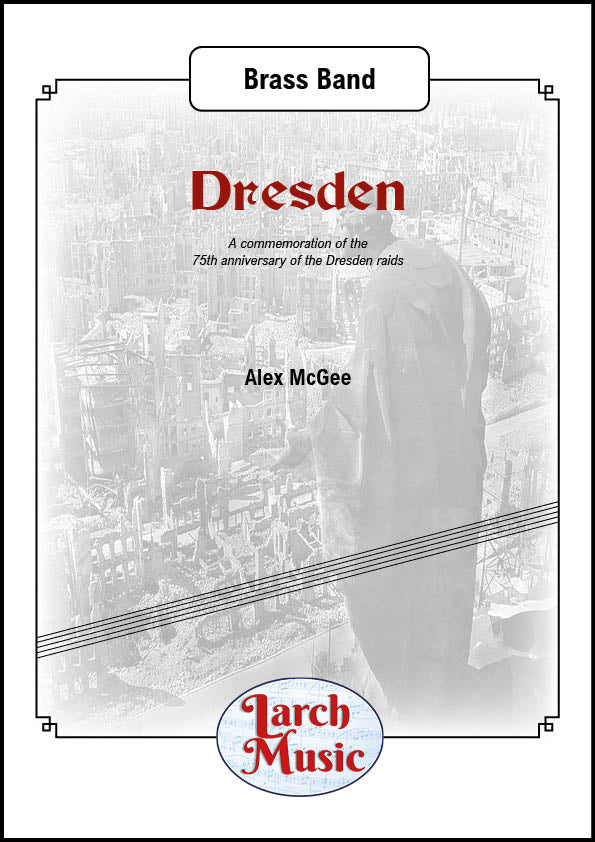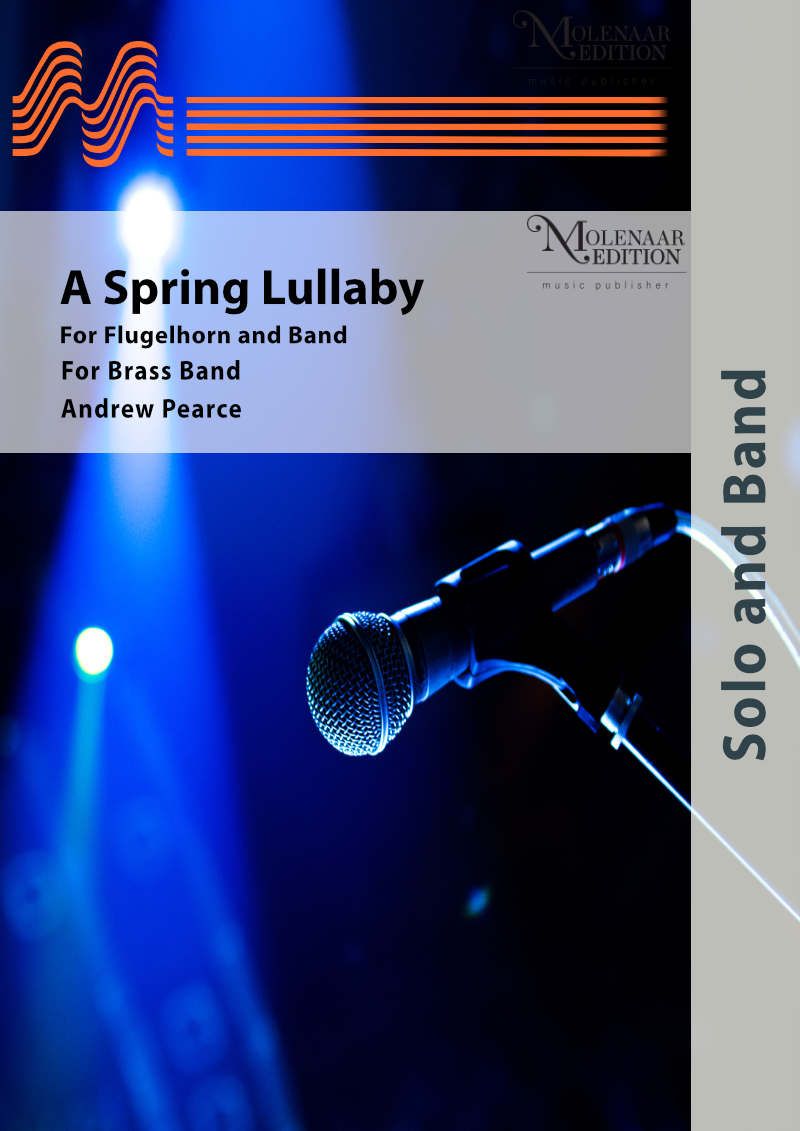Results
-
£84.00
Salute (Bra) - Stijn Aertgeerts
'Salute' is written for conductor Nico Meylemans and the Royal Fanfare Band 'Moed & Volharding' from Heist -op-den -Berg (B). The work commemorates all war victims from Heist-op-den-Berg who died during World War I. The salute is a sign of respect for the fallen, the famous 'Last Post' theme is also incorporated into the piece.
Estimated dispatch 7-14 working days
-
£80.00
Exposure (Bra) - Nick Van Elsen
Exposure is a short opening piece commissioned by Royal Fanfare Band 'De Werkmanszonen' from Zichen (Belgium) and conductor Yves Wuyts for their participation at the World Music Contest 2017 in Kerkrade (NL).
Estimated dispatch 7-14 working days
-
 £25.00
£25.00Dresden - Brass Band - Full Score & Parts - LM955
COMPOSER: Alex McGeeThebombing of Dresdenwas aBritish-Americanaerial bombing attackon the city ofDresden, the capital of the Germanstate ofSaxony, duringWorld War II.In four raids between 13th and 15th February 1945, 722 heavy bombers of theBritishRoyal Air Force(RAF) and 527 of theUnited States Army Air Forces(USAAF)dropped more than 3,900 tons ofhigh-explosivebombsandincendiary deviceson the city.The bombing and the resultingfirestormdestroyed more than1,600 acres (6.5km2) of the city centre.An estimated 22,700to 25,000people were killed.Three more USAAF air raids followed, two occurring on 2nd Marchaimed at the city'srailway marshalling yardand one smaller raid on 17th April aimed at industrial areas.
In Stock: Estimated dispatch 3-5 working days
-
 £76.00
£76.00A Spring Lullaby - Andrew Pearce
During the past few years, Andrew Pearce enjoyed a fruitful collaboration with Phillip Cobb, principal trumpet of the London Symphony Orchestra, composing such works as The Maestro and Interlude for his album in 2012. Later Cobb invited Pearce to compose a slow melody, accompanied by the Central Band of the Royal Air Force for Cobb's upcoming album, displaying his softer, expressive side on flugelhorn. This song-like, warm lilting lullaby reflects on the joy of life.
Estimated dispatch 10-14 working days
-
 £15.00
£15.00Dragon Dances
DescriptionDragon Dances was commissioned by Owen Farr, who is also the work's dedicatee, gave the first performance with the Cornwall Youth Band conducted by Richard Evans on 5 April 2010 and has recorded it on his solo CD "A New Dawn" accompanied by the Cory Band conducted by Philip Harper.Being a Welsh composer, writing music for a Welsh soloist, I was naturally keen to reflect this in the music, and I drew inspiration from two particularly Welsh concepts - "hiraeth" and "hwyl". "Hiraeth" is a word that has no direct translation into English, but an approximation would be 'yearning for home'. Like the other celtic nations, Wales has a widespread diaspora of people who left to seek new lives out in the empire and "hiraeth" is a way of summing up the homesickness felt by these exiles, some of whom return each year for a special ceremony at the Royal National Eisteddfod. "Hwyl" is an even more complicated word, variously meaning ecstatic joy, fervour, equable temperament and even the characteristic sing-song oration style of the great Welsh Methodist preachers.I have attempted to make the music reflect both of these, with the melancholy first part of the work inspired by the hymns and solo songs for which Wales is famous, and the second part having a much more dance-like, joyful quality.Performance Notes:2 solo cornets, 2nd and 3rd cornets require cup mutes. 2 solo cornets require harmon mutes with tubes removed (marked 'TR' in the score).1st horn and 1st baritone require straight mutes, preferably fibre. 1st trombone requires a straight mute, 2nd and bass require cup mutes.Percussion instruments required are vibraphone, glockenspiel, timpani, snare drum, suspended cymbal and tam tamWatch/Listen to the score below:
Estimated dispatch 7-14 working days
-
£103.00
Fest - Polonaise - Johan Svendsen - Kjell Olav Martinsen
Johan Svendsen (1840 - 1911) was the first great Norwegian symphonic composer, as well as one of the leading conductors of his time. Next to Edv. Grieg, he was the most prominent figure in Norwegian music life at the end of the 1800's. Although he came from humble beginnings in Chistiania (now Oslo), he was to become a cosmopolitan who felt at home all over Europa. Svendsen spent most of his adult life abroad, living in Copenhagen for 25 years as maestro for the Royal Theatre Orchestra. Nonetheless he retained contact with Norway troughout these years and was a frequent and popular guest in his native country. He wrote his Festival Polonaise for a ball in 1873. This polonaise in a big ABA style
Estimated dispatch 7-14 working days
-
£90.00
Kobolt - John Brakstad
"Cobalt" was commisioned by Modum Janitsjar as own choice piece for the Norwegian Wind Band Championships, third section in 2009.The Royal Cobalt Works of Modum were established in 1773 to extract cobalt ore from the local mines. The works were in operation until 1893.The cobalt was used in the production of cobalt blue pigment for the worlds porcelain and glass industry.To day it is a museum showing us how people at that time worked and lived.Most of the work was done by hand. There were also bad accidents with many fatalites.But in their free time there were dancing and drinking, and the entire piece ends with a dance-episode including a local tune.
Estimated dispatch 7-14 working days
-
£103.00
Tornado - Fredrick Schjelderup
"Tornado" is based on sketches from the Royal Norwegian Naval Forces' Band (SFMK) Composer Workshop with composition students from The Grieg Aacademy in 2012. The working title of the piece, "Workshopping", reflects a young composer on "shopping" for new timbres and effects within the range of instruments and opportunities. The piece starts with a wind from afar (trills and tremolos) which then builds up in block harmony and various fragments that are processed across different keys and harmonies. Tension between chords and dissonances are then pressed up and develops the character and temperament. The title,Tornado, is selected on the basis of the energy and build up, something that can be translated with the weather phenomenon Tornado . Whirl- wind speed translates into the notation with fast tempo, tremolos and technical parts.
Estimated dispatch 7-14 working days
-
£86.00
Var Flotta - Ivar Widner - Birger Jarl
One of the really great Swedish Marches is Our Fleet which he wrote in 1917 as op. 11. It was composed in Goden as Military March When Widner became conductor of the Royal Swedish Navy Band in Stockholm, he changed the title to Our Fleet.
Estimated dispatch 7-14 working days
-
 £89.95
£89.95Breath of Souls - Paul Lovatt-Cooper
Breath of Souls was commissioned by Weyland and Yvonne Roberts and selected for the 100th National Brass Band Championships of Great Britain at the Royal Albert Hall on October 15th 2011. Duration 13:40
Estimated dispatch 10-14 days

